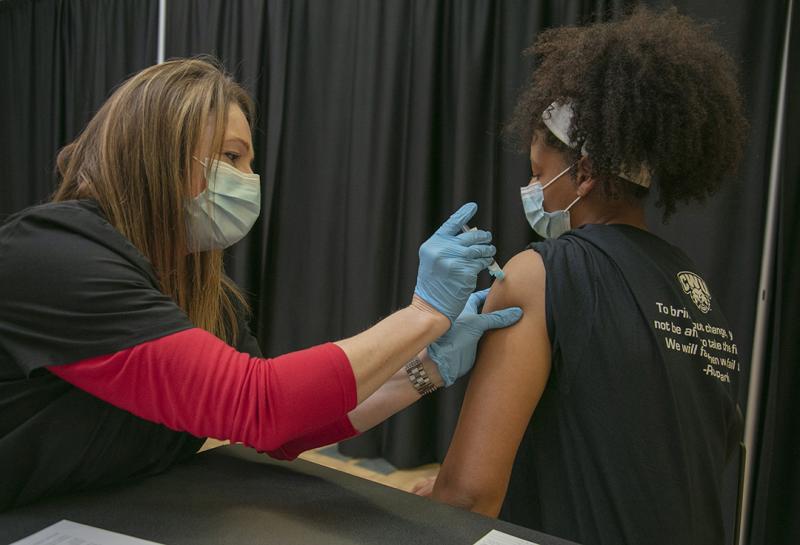We are entering a new phase of the pandemic.
February 23, 2022
The state indoor mask mandate will be rescinded on March 21 except for in certain situations, such as public transit and medical facilities. Gov. Jay Inslee held a press conference on Feb. 17 to provide updated guidelines on what the next stage of the pandemic will look like.
“The virus has changed significantly over the past two years, and so has our ability to fight it,” Inslee said at a press conference. “While caution is still needed, we are entering a new phase of the pandemic.”
It is unclear whether or not the indoor mask mandate will be lifted on CWU’s campus heading into spring quarter.
On Dec. 8, 2021, President Jim Wohlpart put out a message stating, “The Executive Leadership Team has agreed to extend this [indoor mask] requirement through the end of the Winter Quarter, to March 19, 2022. We will consider an additional extension for the Spring Quarter and make an announcement by March 1.”
A survey was sent out to the College of Arts and Humanities students on Feb. 22, looking to gather opinions of students, staff and faculty about possibly lifting the campus indoor mask mandate for spring quarter.
Kasey Knutson, the special programs coordinator and public information officer for the Kittitas County Public Health Department (KCPHD), reported that KCPHD follows the Washington State Department of Health (DOH) guidance but currently doesn’t have any restrictions in place at the local level with regards to mask mandates. The mask mandate is a state requirement that local businesses and schools follow.
Knutson said she is unaware of any further local mask mandates when the statewide mask mandate is lifted in March. In the past, KCPHD has been less strict than the DOH in terms of restrictions.
Due to the rise of rapid at-home COVID-19 tests provided by both state and federal initiatives, Knutson said they are unable to provide a current number with regards to county testing capacity, as these tests may not be reported to local health officials as lab-based PCR tests which are often collected at doctors offices or community testing sites.
Due to local testing shortages, Kittitas Valley Healthcare (KVH) had to temporarily close their clinic in late January, and reopened as of Feb. 10.
Kittitas County also no longer provides a COVID-19 dashboard, instead providing weekly COVID-19 reports and deferring to the DOH dashboard, Knutson reported. Knutson said this was discontinued due to limited resources and the DOH providing duplicate case data.
“We still have a contact investigation team, and they are still receiving positive reports of COVID-19,” Knutson said. “The difference now is that it’s going to move towards a more targeted approach. It’s not going to be a universal case investigation like it was previously.”
The DOH reports a seven-day case rate weekly. As of Feb. 17 Kittitas County had 351 cases per 100,000 population occupying 25% of hospital beds. The state average is 575 cases per 100,000 population. CWU does not publicly release information on current case numbers and instead refers individuals to local health officials at Kittitas County for current data.
Universal case investigation involves contact tracers identifying close contacts of those with a positive test and comparing test results with their close contacts according to Knutson.
Knutson said contact tracing is dependent on overall case rates in the community, meaning higher case rates have larger numbers of contact tracers. In comparison to other countries, Our World in Data reported that the U.S. as a whole is completing less contract tracing than other highly-developed countries, such as Australia or Germany.
“Previously, if we received a positive result for COVID-19, we would call everybody that had a positive test. Moving forward, that’s going to be more targeted towards people who are over 65 or living in a long term care facility,” Knutson said.
With the latest surge in positive cases, Knutson reported that KCPHD was unable to contact every person with a positive case, instead prioritizing those most at risk such as those over 65.
Despite COVID-19 receding from the headlines, local health officials will continue their efforts to monitor the situation.
“Public health will continue their role in the community, and to understand public health is really about stopping the spread of disease and watching population health in our county,” Knutson said. “It’s not unusual for the Kittitas County Public Health Department to have surveillance and respond to other diseases in Kittitas County, so we’ll continue to provide services like we normally do.”
With regards to vaccination, Knutson said, “I think that it’s really important that people have an opportunity to speak to a trusted medical provider, and then make their own decision.”
For those interested in getting a rapid COVID-19 test for free, Washington has a website www.sayyescovidtest.org which provides eligible residents with tests. The federal government also provides free COVID-19 tests through www.covidtests.gov. Further resources on the latest COVID-19 information can be found at DOH.

